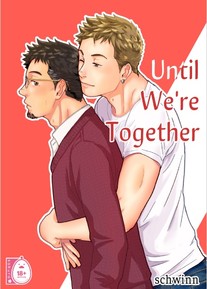Review
by Rebecca Silverman,Until We're Together
GN
| Synopsis: |  |
||
As a closeted teenager, Toshihiko taught himself American English by streaming RuPaul's Drag Race with the aspiration of someday being on the Pit Crew. His English teacher, Mr. Fujii, was one of the only encouraging voices he heard, and when years later he meets Fujii at a gay bar, he seizes the moment. Fujii is understandably leery of dating a former student, but as the two get to know each other better and learn from each other how to navigate their world, something truly special begins to blossom between them. Until We're Together is translated by Zorritov and lettered by FK. |
|||
| Review: | |||
It may only be eighty-seven pages long, but schwinn's Until We're Together manages to tell a full story that at times is strikingly different than many other English-translated BL works. For one thing, a central element of the story is the television show RuPaul's Drag Race - the younger of the story's two protagonists, Toshihiko, watches it as a teen still in the closet. For him the show offers affirmation that it's okay to be who he is, and interestingly enough, it isn't used as a way to introduce dressing in drag into the story. Toshy's goal is to become a member of the show's Pit Crew rather than one of the queens, and he takes the idea that you can't truly know how to love someone else until you love yourself To Heart. Although he doesn't say it, the implication is that RuPaul is the only person he's ever seen express such thoughts and give him permission to be queer, and that makes the show – and the idea that he might someday be able to audition for it – a beacon of hope for him. It also helps him with his English skills, something he's specifically watching the show for. On the page for the ebook on Irodori's site, creator schwinn discusses how “In Japan, you're expected to pronounce English words in a very Japanese way, and they'll find it weird if you pronounce it as an English speaker would.” Toshy turns out o have very good American pronunciation, which does cause his classmates to laugh at him and poke fun. The only person to stand up for him, and to applaud his goal of someday studying in the U.S., is his teacher, Mr. Fujii. This sticks with Toshihiko, and when the story skips ahead to his junior year of college, we see how much of an impact Fujii's quiet encouragement had on him. The simple fact that he's still actively working towards his goal speaks volumes. For his part, Fujii has only recently come out as gay, and he's still struggling with it. At least in part this is because it's something he actively repressed while his homophobic father was alive; it's only after his death that Fujii felt he could admit who he is. To say that he's shaken (and maybe aghast) when a mutual friend introduces him to the now very buff and attractive Toshy might be to understate things. It's not just that Toshihiko was his student five years ago, it's also that he knew him in the “before” period of his life, and that just adds to the emotional awkwardness. It doesn't stop Toshy from pursuing him, but it does give Fujii and additional worry as they begin to grow closer. Also worth noting is the fact that this story incorporates the Covid-19 pandemic. One of the emotional hurdles the two men face is Toshihiko's drive to travel – as a student, he has the freedom to do so while Fujii, as a working adult, does not. This adds to Fujii's worries over being older than his boyfriend and the very different places they're in in life, but when Covid hits, all of that changes. Suddenly the fear is that Toshy won't be able to get home or that one of them will get sick, and that turns into the impetus for Fujii to truly accept how much he cares for the younger man. The use of the pandemic as a plot device isn't overdone, and like in two other titles published in English that handle it (Run on Your New Legs as of volume three and Anyway, I'm Falling in Love with You. from the start), the focus is on how it impacts the characters' plans and lives. As the story progresses, the pandemic does pass, adding to the hopeful quality of the story's ending. And this is a hopeful book. It's warm and welcoming, and a scene near the end reminds readers that everyone needs to feel – and deserves to feel – like they belong. That's really the point of both Toshihiko's and Fujii's journeys, and they both approach and achieve it in different ways. It's also an ode to having pop culture that makes you feel represented, and while the creator notes that they were concerned that non-Japanese audiences would find the story difficult to empathize with, I don't think that's true at all. No matter who you are or where you live, everyone's going to have trouble finding their niche or feeling accepted. Straight or queer, from any nation, we can all relate to finding something you love because it gives you hope. At the end of the day, that's a lot of what this is about, and how that hope can transform into happiness and love. |
| Grade: | |||
|
Overall : A-
Story : A-
Art : B+
+ Warm, ultimately hopeful story. Uncensored art, grounded and kind plot. |
|||
| discuss this in the forum (1 post) | | |||
| Production Info: | ||
|
Full encyclopedia details about |
||